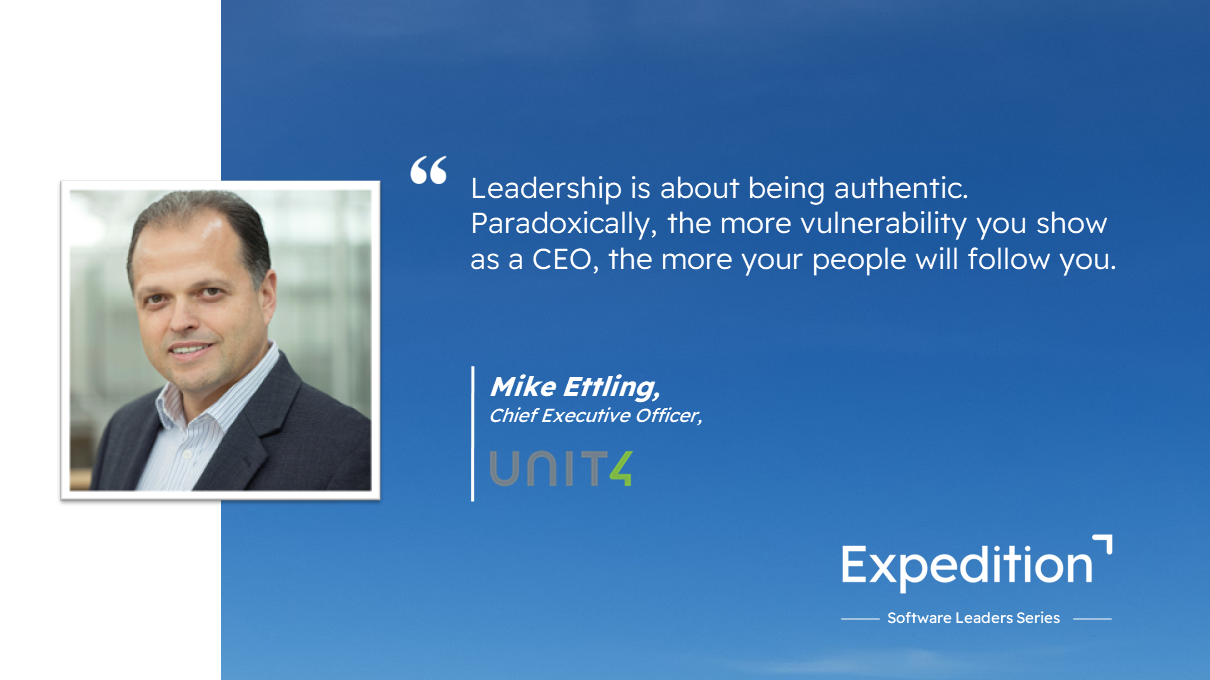In our Software Leaders series, proven operators from the world’s top software companies share learnings and resources for teams earlier in their growth journey. This edition was based on a workshop that Mike Ettling gave at the Expedition Founder & CEO Summit. Mike has over 20 years’ experience in leading, advising, and investing in emerging software companies. He is currently the CEO at Unit4, a provider of cloud-based ERP solutions specializing in services companies. Prior to Unit4, Mike was President of SAP SuccessFactors and CEO at NGA HR (now Alight), a global HR and payroll services provider. Throughout his career, Mike has established himself as a leader who builds and inspires world-class teams, champions diversity, and passionately leverages technology to transform workplaces and help individuals realize their full potential.
Unlocking Leadership Potential: Essential Strategies for Founders and CEOs
There are three critical elements for successfully leading high performing executive teams that Mike emphasizes for founders and CEOs:
- Embrace authentic and vulnerable leadership
- Promote a healthy and diverse culture
- Hire for the organisation you want to be
Leading with Authenticity: The Power of Being Genuine and Supported
Being a leader isn’t just about maintaining a professional façade; it’s about being someone employees can identify with and trust. As a CEO, you need to bridge the gap between your work and home persona. Be genuine, transparent, and authentic. You will build stronger work connections. One of the easiest ways to bridge that gap is to spend personal time with your colleagues. Reflect on what defines you as a person and find a creative way to gather your team around those aspects. For example, Mike found that sharing his cultural background through a South African barbecue helped build more meaningful connections with his team.
Leading with authenticity also means being vulnerable. Don’t try to maintain a superhero persona at all costs. People are more likely to follow your lead if you show vulnerability. And with vulnerability will come support. It’s important that you identify and leverage this support system so you can focus on the things you do best.
According to Mike, an effective support system consists of two elements:
(i) Mentors. Mentors will help you navigate complex challenges and think strategically about your role. But finding a good mentor is not easy. Look for people in your network who have experience, a great ability to listen, and the wisdom to help you discover solutions independently.
(ii) Team leaders. This is where delegation comes into play. By acknowledging the strengths and capabilities of your team, you will be able to delegate responsibilities effectively while fostering a sense of accountability within your organization. Doing so will free up time for more strategic tasks that require your full attention.

Creating a Thriving Company Culture
As a CEO, you play a crucial role in setting and maintaining a healthy company culture. While HR leaders can assist, it is your role to set the tone and be clear about cultural expectations. Implement policies that define acceptable behaviours. Then, ensure everyone adheres to these standards. This approach will shape the company culture with positive behaviours and mutual respect.
After establishing a clear company culture, you can introduce well-being initiatives. These measures can significantly boost team morale and productivity with minimal financial investment. For example, Mike once implemented a “no cap on leave” policy, allowing his team to take any time off they needed as long as their work was completed. This approach paid off significantly by cultivating trust, boosting performance, and reducing anxiety within the team.
Another key element of a thriving company culture is diversity. Implementing diversity programs can be beneficial, but they will be ineffective if you don’t fundamentally value diversity as a strategic asset. A truly diverse workplace should consider cultural, racial, gender, and mental dimensions. Mike found one of SAP’s initiatives particularly compelling for its multi-dimensional approach: hiring autistic individuals in proportion to their representation in the global population.
Scaling Teams for Sustainable Growth
Don’t hire for the company you are; hire for the company you want to be. Plan your hiring strategy based on the skills and roles needed in 12-18 months. This will ensure your team can scale effectively. To avoid being caught off guard, always be on the lookout for new talent and build relationships with those who can help identify potential hires, such as head-hunters, board members, and investors.
As your team grows, it’s increasingly important to implement robust performance models. High-responsibility roles may take longer to show results, so patience and realistic expectations are essential. Trust your key hires’ expertise, but maintain accountability through regular evaluations. Mike finds that, at scale, establishing common goals around EBITDAC (Earnings Before Interest, Taxes, Depreciation, and Amortization, minus any Capitalized R&D Expenses) and NRR (Net Revenue Retention) helps drive alignment. EBITDAC captures sales, profitability and efficiency, while NRR measures customer retention and success. Tying bonuses and performance incentives to these metrics ensures leaders focus on both profitability and customer satisfaction, aligning their efforts with company goals.
Wrapping Up
To successfully lead executive teams, you must strike a delicate balance: being vulnerable yet firm, validating but challenging. It’s about fostering a culture of respect, empowerment, and inclusivity while maintaining processes to ensure performance assessment. As you scale, the foresight to plan ahead must be coupled with the wisdom to keep your team aligned around shared goals, blending vision for the future with cohesion in the present.
